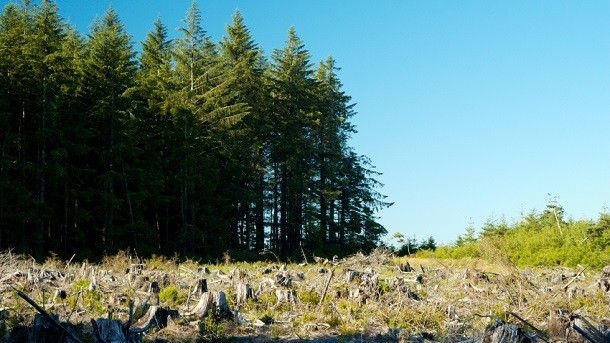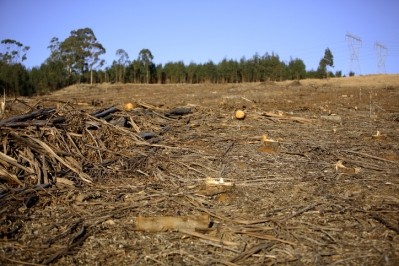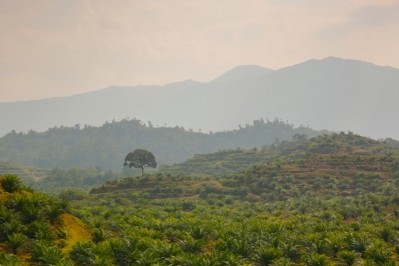How can the food industry accelerate action on deforestation?

Forests cover about 30% of the planet’s landmass – but they are shrinking at an alarming rate. According to the World Bank, between 1990 and 2015 there has been a 3% decline forested land globally – that equates to 1.3 million square kilometres, or an area roughly the size of South Africa. Much deforestation has been driven by the growing demand for agricultural commodities, such as palm oil, soy and cocoa.
“Our global demand for commodities such as palm oil, soy, beef and paper packaging is driving forest loss, exacerbating climate change and putting biodiversity at risk,” Sarah Rogerson, a researcher in NGO Global Canopy’s supply chain programme, warned.
Falling in behind global commitments such as the New York Declaration on Forests and the United Nation’s Sustainability Development Goals, more and more large food companies are making pledges to eradicate deforestation from their supply chains.
In its new Forest 500 report, released today (21 March), non-profit Global Canopy assessed 500 companies and financial institutions that it said have the power to significantly reduce tropical deforestation. Global Canopy discovered that 164 of the 350 companies assessed have set time-bound targets on the topic.
From this data, Global Canopy compiled a list of the best – and worst - performers. The top five manufacturers included Nestlé, Unilever and Mars alongside personal care and consumer products companies Kao Corp and L’Oreal. From retail, Marks and Spencer, IKEA, News Corp McDonald’s and Pearson ranked best.
The 2018 assessment also looked at 150 financial institutions – selected because of their role in financing the 350 companies involved in forest-risk supply chains. It found two thirds of the financial institutions assessed in 2018 did not have any policies on deforestation, despite growing concerns that deforestation and the related climate impacts can create a financial risk.
Top 5 manufacturers | Score (%) | Score Band (/5) |
Nestlé S.A. | 88 | 5 |
Kao Corp. | 81 | 5 |
Unilever PLC | 73 | 4 |
Mars Inc. | 67 | 4 |
L'Oreal S.A. | 65 | 4 |
Average Manufacturer | 22 | 2 |
Top 5 retailers | Score (%) | Score Band (/5) |
Marks and Spencer | 63 | 4 |
IKEA | 59 | 3 |
News Corp | 54 | 3 |
McDonald’s | 51 | 3 |
Pearson | 49 | 3 |
Average Retailer | 21 | 2 |
Implementation is crucial
While the issue of deforestation is commanding increasing attention, Global Canopy was critical that “strong commitments” are failing to be translated to action on the ground.
Global Canopy stressed that even the top-scoring companies in the Forest 500 assessment – such as Unilever, Mars, Marks & Spencer and Ikea – lost points because although they have set clear targets, they are not consistently reporting strong implementation across all of their supply chains.
Measuring and reporting progress is widely regarded as a key tenant of good practice in sustainability initiatives. Global Canopy discovered that of the 164 companies who set time-bound targets for eliminating deforestation, only 50 of them showed evidence of implementation across all of their commodities.
Just under a third of the companies that have made commitments – 29% - do not appear to be taking “any action” to implement those commitments, Global Canopy stressed.
As a result, the 2020 deadline to eliminate deforestation from agricultural commodity supply chains – as agreed in 2014 in the New York Declaration on Forests – will not be met, the non-profit warned.
Rogerson said food manufacturers need to raise their game if they are to avert this failure.
“The most powerful companies in forest-risk supply chains do not appear to be implementing the commitments they have set to meet global deforestation targets. With the 2020 deadline looming, it is crucial that companies raise their ambition and address the stark gap between the promises they have made and activities on the ground,” she argued.
Inconsistent performance
Global Canopy also concluded that progress was patchy depending on the commodity sourced.
Companies sourcing palm oil were most likely to have a commitment in 2018, while just 16% of companies sourcing beef and other cattle products from tropical forest countries had a deforestation commitment in place.
Data from research provider Lumina Intelligence also flagged an uneven performance across different commodities.
Lumina’s analysis of 900+ pledges made in the corporate social responsibility reports showed ‘no deforestation & agroforestry’ commitments make up 5% of industry pledges with 59% of companies analysed making commitments on the issue.
The Lumina Intelligence Sustainability index reveals more commitments have been made to combat deforestation in cocoa (26 pledges) than in coffee (7), tea (2) and palm oil (12).
Looking at the performance of the best performing commodities could open the door to raising standards across the board.
Commenting on the market-leading progress made in cocoa, Lumina analyst Oliver Nieburg said: “The multi-stakeholder platform, the Cocoa & Forests Initiative (CFI), has sparked action plans from the major players in cocoa, despite timber, soy and palm oil and livestock being stronger drivers of global deforestation.
“CFI is in the process of promoting more stringent regulation in the main cocoa-growing countries to combat deforestation and to support farmers operating in at risk areas to find alternative livelihoods."
Next steps: a call to action
Nieburg said one of the biggest barriers to tracking and evidencing zero-deforestation is the “largely untraceable supply chains for some commodities”. Advances in transparency driven by technological developments may help address this issue moving forward.
“Mobile traceability technology, the emergence of satellite imagery and commitments to map supply chains – which we have only seen recently - should lend more credibility to claims. It’s easier to determine if deforestation occurs when you know where raw materials come from,” the sustainability expert noted.
Closer collaboration between industry and government is also needed to move the needle on deforestation. “Governments also shoulder responsibility to halt deforestation, so it is encouraging to see stronger alignment. The next stage will be to agree norms on how to measure land degradation and the loss of natural habitats and biodiversity,” Nieburg said.
Likewise, Rogerson suggested that companies need to work more closely with their suppliers to drive change. “Companies have the power to stop forest loss by engaging with suppliers and insisting that supplies are deforestation-free.
“While it is great to see that more than half of the companies have commitments, deforestation is increasing in some parts of the world. We need companies to implement their commitments on the ground.”
























